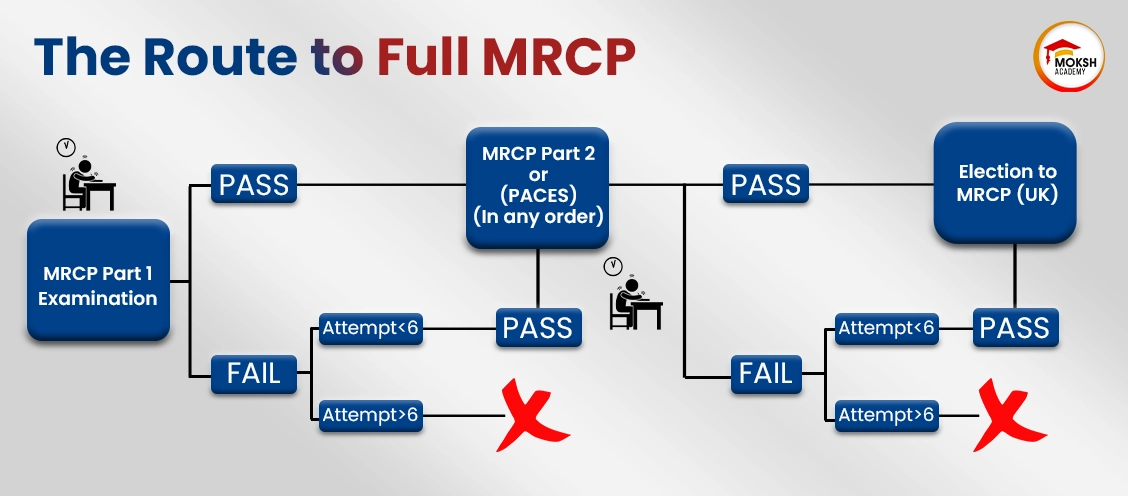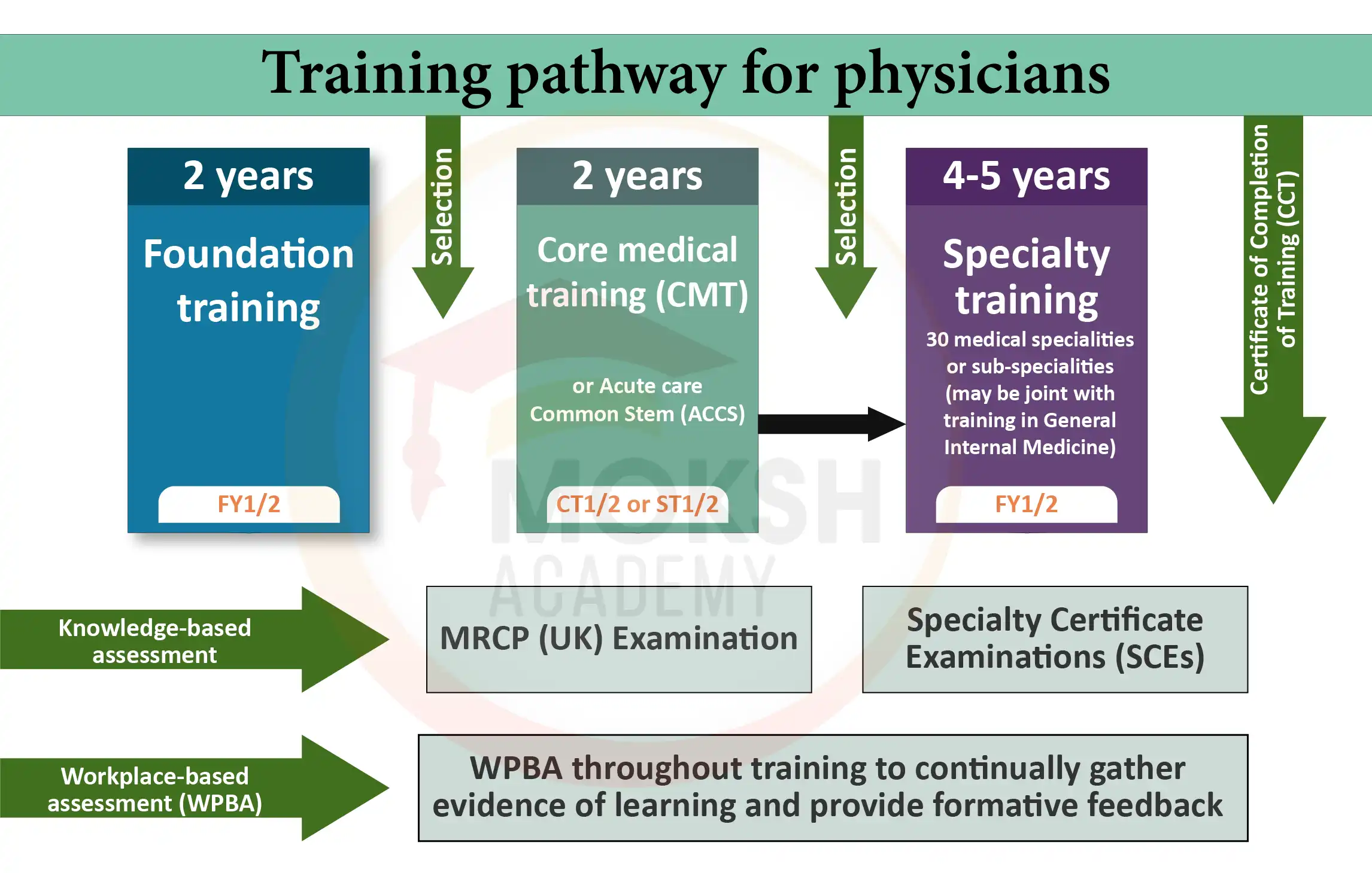.webp)
MRCP stands for Membership of the Royal Colleges of Physicians of the UK. The Federation of the Royal Colleges of Physicians, headquartered in the UK and extending its influence globally, represents a partnership between the
- Royal College of Physicians of Edinburgh
- Royal College of Physicians and Surgeons of Glasgow
- Royal College of Physicians
the colleges collectively represent over 50,000 physicians across the globe. They offer an invaluable professional network and serve as a platform for physicians in the UK and worldwide to exchange best practices and access continuous educational opportunities.
MRCP (UK) Steps
The MRCP UK administers exams and certifications globally. The Royal Colleges of Physicians (UK) Diploma comprises the

MRCP Exam Pattern
| |
Part 1 |
Part 2 |
PACES |
| Duration of Paper |
3 hours |
3 Hours |
half Day |
| No of Papers |
Two |
Two |
5 Stations |
| No of Qus/Skills |
100 MCQs |
100 MCQs |
7 Core Skills |
| Qus Format |
Non Image |
Image |
8 Patients interaction |
| Marking Scheme |
For Correct +1 Marks,0 Marks For Wrong answer or two answers for a Qus |
|
| Passing Marks |
540 |
454 |
130 & Pass all 5 Station |
| Exam fee |
£616 |
£616 |
£1202 |
apply for MRCP without NEET PG, PLAB and IELTS.
Difference between MRCP Part 1 & 2
The MRCP Part 1 exam builds upon the foundational knowledge of basic medical science acquired during undergraduate education. It covers various subjects in a multiple-choice format to ascertain the candidate's proficiency as a doctor. MRCP Part 1 focuses on testing comprehension of common disorders, clinical sciences, and UK national guidelines.
Similarly structured with multiple-choice questions, MRCP Part 2 evaluates candidates' practical understanding gained from Part 1. However, questions in MRCP Part 2 often include images to underscore the interpretation of investigative outcomes. Throughout the exam, candidates are assessed on their medical abilities, knowledge, and professional conduct in handling specific medical scenarios.

MRCP Exam assessments evaluates doctors' skills, knowledge, and performance during their training. Successful completion of all three parts is obligatory before embarking on specialized internal medicine training in the UK. The MRCP (UK) and Specialty Certificate Examinations hold official approval from the General Medical Council (GMC) as vital elements of the UK's postgraduate medical training regimen, closely aligned with the country's curriculum and standards.
Foundation Years
The foundation years (FY1 and FY2) training allows newly graduated doctors to attain both general clinical and non-clinical proficiencies outlined in the UK curriculum. This encompasses experiences in acute care, community medicine, mental health, and general practice, serving as a transitional phase between medical school and specialized training.
Internal Medicine Training
Internal Medicine Training (IMT) represents the initial phase of specialty training for most physicians specializing in physical disciplines. It equips trainees to assume senior responsibilities in the acute medical setting and effectively manage patients with both acute and chronic medical conditions, whether in outpatient or inpatient settings. The curriculum for IMT Stage 1 gained approval from the GMC in December 2017 and superseded Core Medical Training (CMT) in August 2019. Completion of IMT and attainment of the full MRCP UK Diploma are prerequisites for embarking on specialty training at ST4 level by 2022. Certain specialties (referred to as group 2 specialties) may consider applicants who have completed two years of IMT and have obtained the MRCP UK qualification at the ST3 level.
Specialty Training
Specialty Training (ST3 - 6) comprises National Health Service (NHS) training positions focusing on particular specialties, succeeding core medical training.
Specialty Certificate Examinations (SCEs)
SCEs are essential for physicians undergoing training in the UK. To be admitted to the GMC Specialist Register, physicians must pass the relevant SCE and fulfil the requirements of an approved specialty training program. Passing the SCE demonstrates physicians' proficiency and ensures they possess adequate knowledge in their specialty to practice as consultants safely and effectively.
Get Free Counselling
Explore more
MRCP UK Part 1
MRCP UK Part 2
MRCP PACES
FAQs
MRCP Medical abbreviation or MRCP full form in medical Qualification stands for Membership of the Royal Colleges of Physicians of the UK
The primary distinction between PLAB and MRCP lies in their eligibility criteria and career trajectories.
- While MRCP requires a minimum of 12 months of experience before one can take the exam, PLAB permits MBBS graduates to appear immediately after completing their degree.
- PLAB typically leads to junior positions, whereas achieving MRCP enables individuals to commence their NHS careers at a more advanced level, specialising in areas such as General or Acute Medicine.




